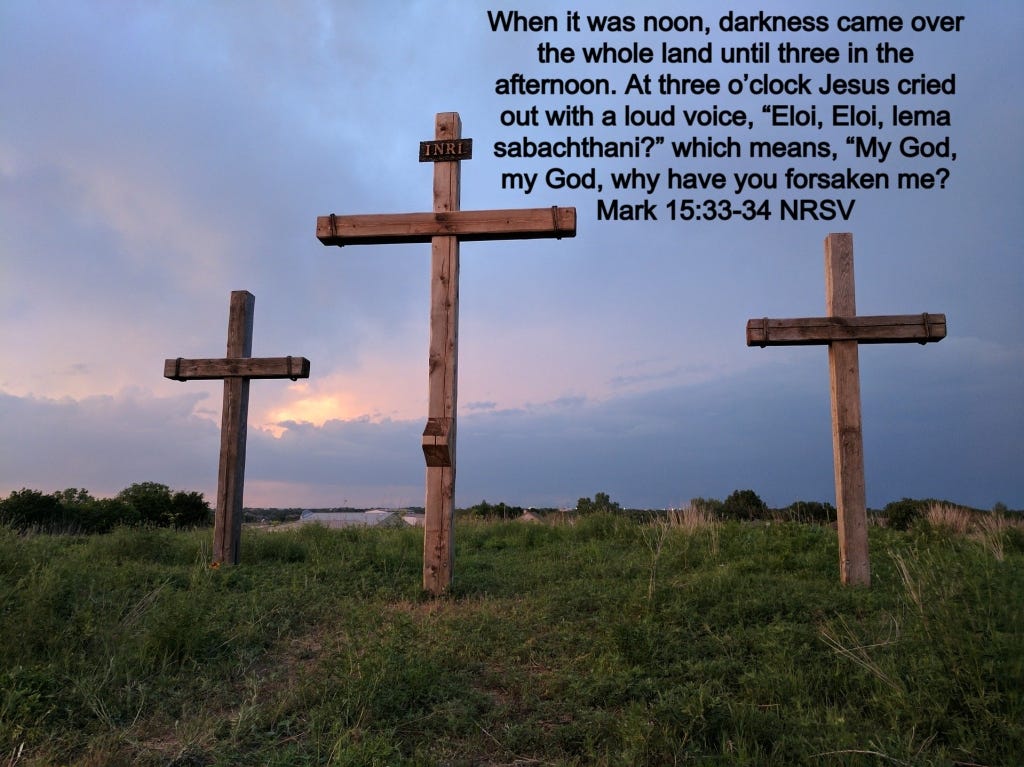The God Who Suffers
For most of us, we didn’t expect to spend Good Friday physically isolated from others. I don’t know about you, but I love Church holidays. Especially since I’m not a pastor, so I’m not in charge of planning anything! But I love attending multiple church services and although I’ve read/heard the gospel narratives on the Last Super and Jesus’ crucifixion and resurrection a thousand times, there’s something meaningful about physically being present with others as we hear these stories again. Physically being present with others serves as a reminder that no matter how difficult and painful things in our life get, that we are never truly alone. Good Friday services, serve as a reminder that even as we grieve and suffer, there are others willing to stand beside us.
But of course, this year, things are different. This year, meeting in person would lead to the deaths of many people. So out of love and compassion for one another, many congregations are hosting services online. And while many churches are doing a great job of fostering community online and enabling us to continue to hold onto our beloved traditions in some form, the reality is that, at least for me, online services are not the same. As someone who is single and without kids, whose relationship with various members of my family is complicated, church has been one of my few outlets for socialization. When everything was falling apart in my own life, I still had church as a consistent presence.
Now, even as I try to connect with others online and participate in virtual services, the loneliness and depression are overwhelming. Yet, this immense sense of isolation and sadness has served as a tiny reminder of the anguish and depression Jesus and the disciples must have experienced. Please, be sure, I am not in any way making a statement of equivalence between my experiences and Jesus’ crucifixion. There is no comparison. The physical, mental, and spiritual anguish that Jesus and the disciples experienced is hard for me to fathom.
But throughout the past few months I’ve talked a lot about God’s presence, about God being with us as we suffer. And the story of Jesus’ crucifixion serves as proof of God’s ability and willingness to suffer alongside us. Growing up, I was taught that Jesus’ crucifixion was a bloody punishment for humanity’s sinfulness. It was a way for God to satisfy his need for justice, though often times, God’s justice appeared more akin to vengeance,
But as I’ve walked away from that interpretation of Jesus’ death, I’ve found myself continuing to embrace the idea that God, through Jesus, suffered and died on the cross. Not as an act of appeasement for a violent God, but as a radical act of solidarity for all of us in the midst of our own suffering.
Jesus’ death is evidence that God doesn’t just passively watch our suffering, indifferent to our anguish but that God actively joins us in our pain and grief. God doesn’t sit up in the sky, controlling everything, like some sort of cosmic puppet master, but God becomes one of us and experiences the frailty of humanity. God confronts the injustices of corrupt governments and pays the price. God experiences betrayal. God is rejected, mocked. God knows what depression and abandonment feels like.
Instead of an indifferent deity figure that only has a passing interest in humanity, the story of Good Friday is one of a God that knows from personal experience, pain, suffering, and death. And that knowledge is what I cling too in the midst of despair.
That information, that God, through Jesus understands intimately what it means to be human and to experience pain, doesn’t necessarily eradicate our present suffering or immediately ease the loneliness that aches for physical companionship, but as we make our way through our own personal mini-Good Fridays, it serves as a reminder that we believe in a God that journeys with us through pain. On Sunday, yes, we will talk about resurrection and hope that pain will eventually end and despair quieted. But for now, as we pass through these days filled with loneliness, depression, and listlessness we do so knowing that we serve a God who understands our anguish.





